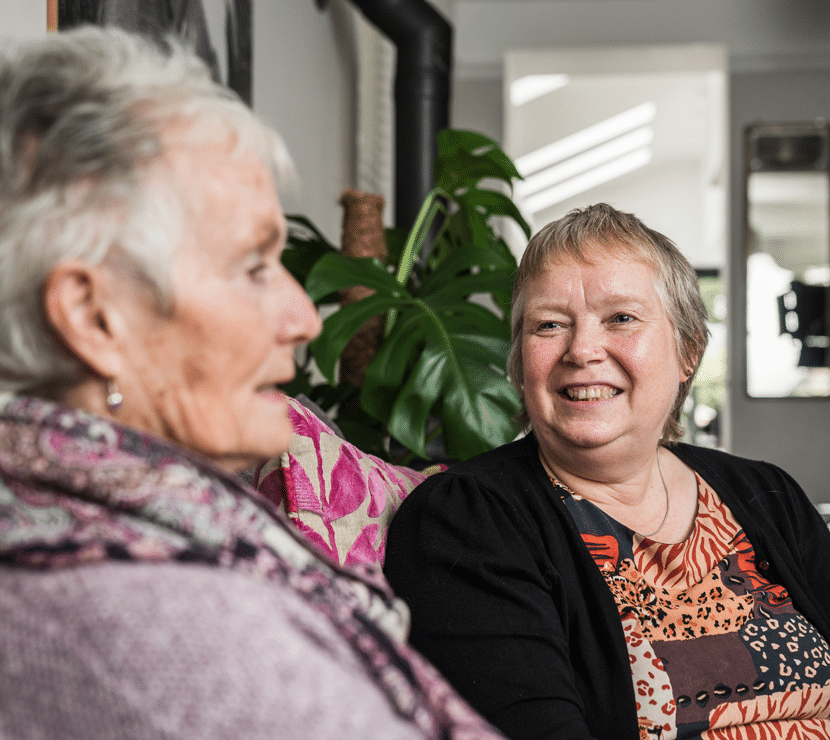Agitation, a distressing symptom commonly experienced by people living with dementia, can cause stress for both the person affected and their caregivers. But with the right person-centred approach and calming strategies, it’s possible to create a soothing environment that promotes a sense of calm and well-being.
Drawing inspiration from our experienced caregivers and experts in the field, we’ve compiled a list of 10 proven methods to address agitation in people living with dementia. Each approach is tailored to provide a compassionate and person-centred approach, recognising the unique needs and challenges faced by those living with dementia.
1. Stay calm
It can be upsetting when a loved one is feeling agitated or stressed and we can’t seem to meet or understand their needs and wants. Agitation can be contagious. If you get agitated or flustered when your loved one is upset, it can further escalate the situation.
Take a deep breath to calm down and assess the situation. See if you can find the source of the tension in the room, such as too many loud noises or bright lighting. Remember that your loved one is not trying to give you a hard time and is likely struggling themselves.
2. Create a calming environment
One of the best ways to help calm agitation in a person living with dementia is by creating a soothing and supportive environment. By taking simple yet impactful steps, caregivers can promote a sense of calmness and reduce stress levels.
Begin by ensuring a quiet and peaceful atmosphere in the living space. Limit loud noises and minimise disruptive sounds that could agitate someone with dementia. Consider playing soft, calming music or nature sounds to create a serene ambience.
Reducing clutter and distractions in the environment can have a significant impact on promoting calmness. Keep the living space organised and free of unnecessary items that may cause confusion or frustration. Streamline the layout of furniture and belongings to create a clear and uncluttered space that is easy to navigate.
The use of soothing colours and appropriate lighting can contribute to a calming environment. Choose soft, muted tones for walls and decor, such as pastels or earthy shades, which can help create a sense of tranquillity. Ensure that the lighting is gentle and diffused, avoiding harsh or flickering lights that may cause discomfort or disorientation.
3. Maintain a consistent routine
Maintaining a consistent routine is important for people living with dementia as it provides a sense of structure, familiarity, and security. A consistent daily schedule can help reduce anxiety and agitation by creating a predictable and reassuring environment.
Start by establishing a clear and structured routine that encompasses all daily activities. Wake up and go to bed at consistent times to regulate sleep patterns. Ensure that meals are provided at regular intervals, as hunger can contribute to increased restlessness and irritability. Alongside meals, schedule designated rest breaks throughout the day to prevent fatigue and allow for moments of relaxation.
Incorporating familiar activities and hobbies into the daily routine is also beneficial. Engaging in activities that the individual enjoys and feels comfortable with can provide a sense of purpose and accomplishment. Whether it’s gardening, listening to music, or participating in light exercises, these activities can serve as meaningful and enjoyable experiences.
Throughout the routine, try to maintain patience and allow flexibility. Recognising that some adjustments may be needed to accommodate the person’s changing needs can help the day go smoothly.
4. Communicate effectively
Clear and effective communication is essential when interacting with people with dementia, as it can significantly influence their level of agitation and overall sense of well-being.
One important part of effective communication is using simple and clear language. Complex sentences and intricate explanations can lead to confusion and frustration. Instead, opt for short, straightforward sentences and familiar words that are easier to understand. Breaking down information into manageable chunks can help facilitate understanding.
Maintaining eye contact and adopting a calm tone of voice are powerful tools in communication. Directly facing the person and establishing eye contact can create a sense of connection and demonstrate genuine attentiveness. Speaking in a gentle and soothing tone can help reassure your loved one and reduce the likelihood of escalating agitation. Patience is key. Always allow sufficient time for the individual to process information and respond at their own pace.
5. Engage in relaxation techniques
Incorporating relaxation techniques into the daily routine of your loved one can be incredibly beneficial in calming agitation. These techniques help to reduce stress, anxiety, and restlessness. Here are some effective relaxation methods to consider:
- Practise deep breathing exercises together: Encourage slow, deep breaths and guide your loved one through calming breathing exercises. Deep breathing can help regulate their heart rate, induce a sense of calmness, and alleviate anxiety. Take deep breaths together, counting in and out, allowing them to follow your lead.
- Explore gentle stretching or yoga exercises: Engaging in gentle stretching or modified yoga poses can help release tension and promote relaxation. Focus on simple, safe movements that can be easily performed while seated or standing, depending on the person’s abilities.
- Offer soothing music: Music has a powerful impact on mood and emotions. Play soft, soothing music that your loved one finds comforting. Consider their preferences and choose calming melodies or familiar tunes that evoke positive memories.
6. Encourage meaningful social interactions
Encouraging meaningful social interactions is essential for enhancing the well-being of people living with dementia. Meaningful connections with loved ones and friends play a vital role in maintaining a sense of belonging and social engagement.
Here are some effective strategies to help promote positive social interactions:
- Foster connections with loved ones and friends: Encourage regular interactions with family members, close friends, and individuals who hold significance in the person’s life. These connections provide a sense of familiarity and can help alleviate feelings of loneliness or isolation.
- Arrange visits or engage in group activities: Organise visits or outings with family and friends in a calm and familiar environment. Engaging in group activities, such as simple games, crafts, or gentle exercises, can foster a sense of belonging and promote social interaction. Just be sure to choose activities that are suitable for your loved one’s cognitive abilities and interests.
- Involve the person in conversations and reminiscing: Encourage the person to participate in conversations and share their thoughts and memories. Engage in reminiscing activities by looking at old photographs, sharing stories, or listening to their favourite music.
7. Provide sensory stimulation
Sensory experiences can help evoke positive emotions and create a soothing environment. Here are some strategies to consider:
- Offer comforting tactile objects: Provide soft blankets, plush toys, or stress balls for the person to touch and hold. These tactile objects can offer a sense of comfort and security, promoting relaxation and reducing anxiety.
- Create a sensory garden or use sensory toys: If possible, create a sensory garden where the person can engage with nature and experience various sensory stimuli like the feel of different textures, the smell of flowers, or the sound of rustling leaves. Alternatively, use sensory toys that engage different senses, such as textured balls or fidget spinners.
- Experiment with different textures, scents, and sounds: Introduce a variety of textures, scents, and sounds to stimulate the senses. Offer different fabrics with varying textures for them to feel, such as smooth silk or cosy fleece. Explore scents like lavender or vanilla that are known for their calming properties.
8. Utilise therapeutic activities
Incorporating therapeutic activities into your daily routine can have a calming effect long after the activity is done. Encourage the person to participate in art therapy or engage in creative activities. Provide art supplies, such as colouring books, drawing materials, or craft materials to help stimulate their creativity. Artistic expression can be therapeutic, allowing individuals to communicate their emotions, reduce stress, and find a sense of fulfilment.
You can also try gentle exercises or modified games. Consider activities like seated exercises, stretching routines, or modified versions of familiar games that promote movement, coordination, and cognitive stimulation.
9. Ensure physical comfort
Ensuring physical comfort is crucial in calming agitation and promoting well-being. Regularly assess for any signs of pain or discomfort and take appropriate action. People with dementia may have difficulty expressing their discomfort, so pay attention to non-verbal cues like facial expressions or body language. Consult with health care professionals to manage pain effectively and ensure the person’s comfort.
Help your loved one with personal care tasks to ensure their physical comforts, such as bathing, grooming, and dressing, to ensure their physical comfort. Maintain a gentle and patient approach, respecting their dignity and autonomy as much as possible.
10. Seek professional support
Seeking professional support is essential in managing the challenges associated with dementia. Health care professionals can provide personalised guidance, offer valuable insights, and recommend appropriate interventions.
Reach out to health care professionals specialising in dementia care, such as doctors, geriatric specialists, or dementia care nurses. They can assess the individual’s specific needs, provide tailored recommendations, and offer strategies to manage agitation effectively. Collaborate with them to develop a comprehensive care plan.
Support groups and counselling services can be invaluable resources for both people with dementia and their caregivers. Joining a support group allows for connection with others who understand the challenges of dementia, providing a supportive environment to share experiences and learn coping strategies. Individual or family counselling can also provide guidance and emotional support.
Our live-in dementia care service
At Oxford Aunts we understand how upsetting it can be when a loved one receives a diagnosis of dementia or is living with memory loss that is progressing. As a family carer, you may be finding it more and more difficult to cope with the situation – you are not alone.
Through our years of experience in providing support to people living with dementia, we know that home is best for receiving dementia care. Remaining in the safety and familiarity of their own much-loved home for as long as possible provides the greatest comfort to those living with dementia and their families.
With live-in care provided by Oxford Aunts, you can be assured of a high-quality live-in care service provided by a trusted and established provider – a service that has provided peace of mind to many families, for many years.
Get in touch with us about your dementia care needs
Our expert care advisors are here to help you understand the options available to you.





